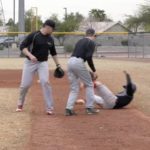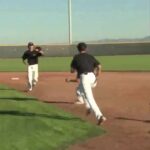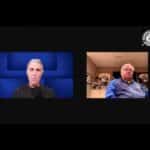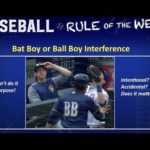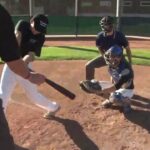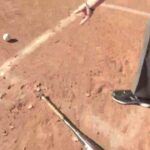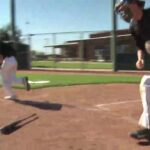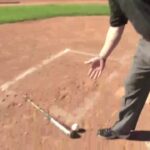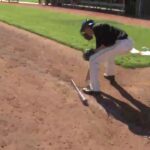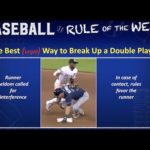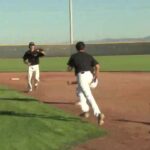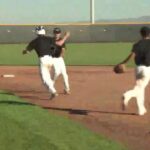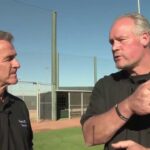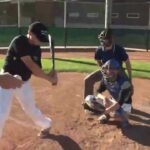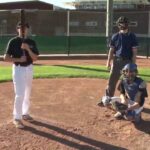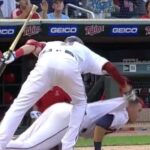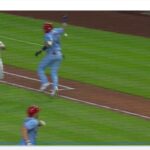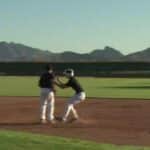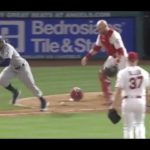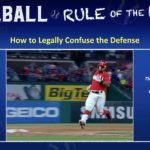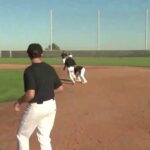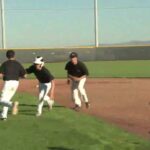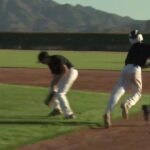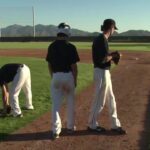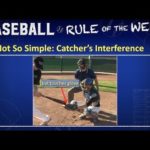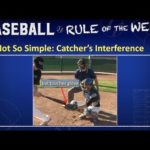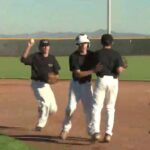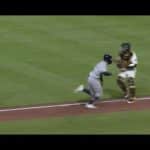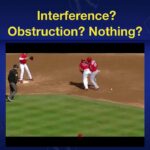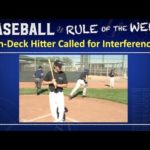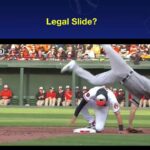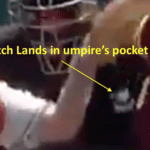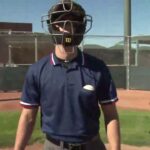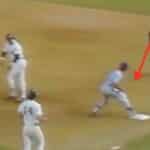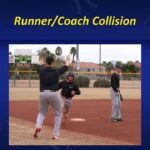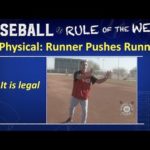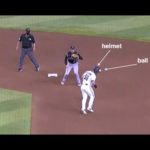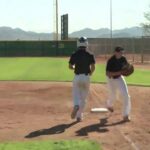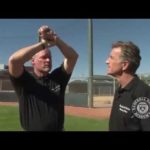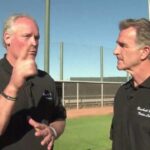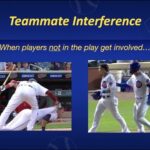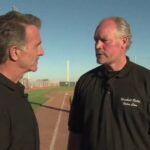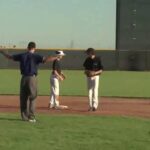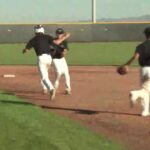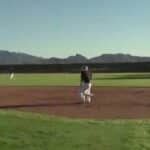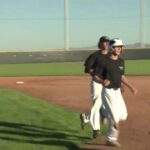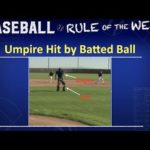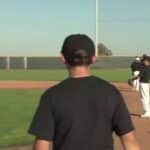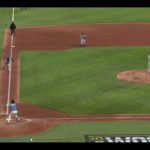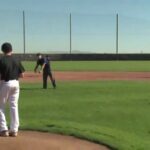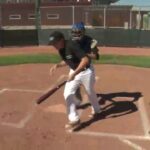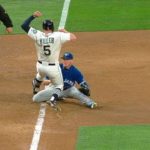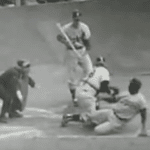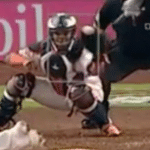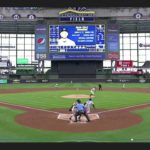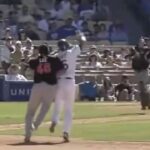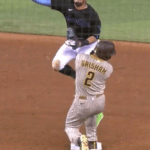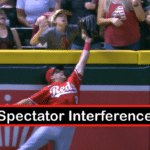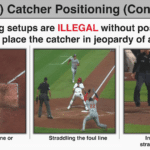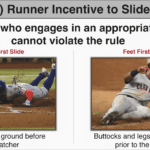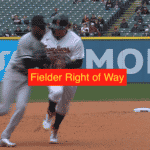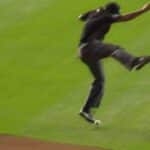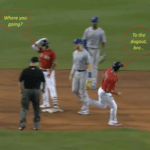6.01 Interference, Obstruction, and Catcher Collisions
(a) Batter or Runner Interference
It is interference by a batter or a runner when:
(1) After a third strike that is not caught by the catcher, the batter-runner clearly hinders the catcher in his attempt to field the ball. Such batter runner is out, the ball is dead, and all other runners return to the bases they occupied at the time of the pitch;
Rule 6.01(a)(1) Comment:
If the pitched ball deflects off the catcher or umpire and subsequently touches the batter-runner, it is not considered interference unless, in the judgment of the umpire, the batter-runner clearly hinders the catcher in his attempt to field the ball.
(2) He intentionally deflects the course of a foul ball in any manner;
(3) Before two are out and a runner on third base, the batter hinders a fielder in making a play at home base; the runner is out;
(4) Any member or members of the offensive team stand or gather around any base to which a runner is advancing, to confuse, hinder or add to the difficulty of the fielders. Such runner shall be declared out for the interference of his teammate or teammates;
(5) Any batter or runner who has just been put out, or any runner who has just scored, hinders or impedes any following play being made on a runner. Such runner shall be declared out for the interference of his teammate (see Rule 6.01(j));
Rule 6.01(a)(5) Comment:
If the batter or a runner continues to advance or returns or attempts to return to his last legally touched base after he has been put out, he shall not by that act alone be considered as confusing, hindering or impeding the fielders.
(6) If, in the judgment of the umpire, a base runner willfully and deliberately interferes with a batted ball or a fielder in the act of fielding a batted ball with the obvious intent to break up a double play, the ball is dead. The umpire shall call the runner out for interference and also call out the batter-runner because of the action of his teammate. In no event may bases be run or runs scored because of such action by a runner (see Rule 6.01(j));
(7) If, in the judgment of the umpire, a batter-runner willfully and deliberately interferes with a batted ball or a fielder in the act of fielding a batted ball, with the obvious intent
to break up a double play, the ball is dead; the umpire shall call the batter-runner out for interference and shall call out the runner who had advanced closest to the home plate regardless where the double play might have been possible. In no event shall bases be run because of such interference (see Rule 6.01(j));
(8) In the judgment of the umpire, the base coach at third base, or first base, by touching or holding the runner, physically assists him in returning to or leaving third base or first base;
(9) With a runner on third base, the base coach leaves his box and acts in any manner to draw a throw by a fielder;
(10) He fails to avoid a fielder who is attempting to field a batted ball, or intentionally interferes with a thrown ball, provided that if two or more fielders attempt to field a batted ball, and the runner comes in contact with one or more of them, the umpire shall determine which fielder is entitled to the benefit of this rule, and shall not declare the runner out for coming in contact with a fielder other than the one the umpire determines to be entitled to field such a ball. The umpire shall call the runner out in accordance with Rule 5.09(b)(3) (former Rule 7.08(b)). If the batter-runner is adjudged not to have hindered a fielder attempting to make a play on a batted ball, and if the base runner’s interference is adjudged not to be intentional, the batter-runner shall be awarded first base;
Rule 6.01(a)(10) Comment:
When a catcher and batter-runner going to first base have contact when the catcher is fielding the ball, there is generally no violation and nothing should be called. “Obstruction” by a fielder attempting to field a ball should be called only in very flagrant and violent cases because the rules give him the right of way, but of course such “right of way” is not a license to, for example, intentionally trip a runner even though fielding the ball. If the catcher is fielding the ball and any fielder, including the pitcher, obstructs a runner going to first base, “obstruction” shall be called and the base runner awarded first base.
(11) A fair ball touches him on fair territory before touching a fielder. If a fair ball goes through, or by, an infielder, and touches a runner immediately back of him, or touches the
runner after having been deflected by a fielder, the umpire shall not declare the runner out for being touched by a batted ball. In making such decision the umpire must be convinced that the ball passed through, or by, the fielder, and that no other infielder had the chance to make a play on the ball. If, in the judgment of the umpire, the runner deliberately and intentionally kicks such a batted ball on which the infielder has missed a play, then the runner shall be called out for interference.
PENALTY FOR INTERFERENCE:
The runner is out and the ball is dead. If the umpire declares the batter, batter-runner, or a runner out for interference, all other runners shall return to the last base that was in the judgment of the umpire, legally touched at the time of the interference, unless otherwise provided by these rules.
In the event the batter-runner has not reached first base, all runners shall return to the base last occupied at the time of the pitch; provided, however, if during an intervening play at the plate with less than two outs a runner scores, and then the batter-runner is called out for interference outside the three-foot lane, the runner is safe and the run shall count.
Rule 6.01(a) Penalty for Interference Comment:
A runner who is adjudged to have hindered a fielder who is attempting to make a play on a batted ball is out whether it was intentional or not. If, however, the runner has contact with a legally occupied base when he hinders the fielder, he shall not be called out unless, in the umpire’s judgment, such hindrance, whether it occurs on fair or foul territory, is intentional. If the umpire declares the hindrance intentional, the following penalty shall apply: With less than two out, the umpire shall declare both the runner and batter out. With two out, the umpire shall declare the batter out.
If, in a run-down between third base and home plate, the succeeding runner has advanced and is standing on third base when the runner in a run-down is called out for offensive interference, the umpire shall send the runner standing on third base back to second base. This same principle applies if there is a run-down between second and third base and succeeding runner has reached second (the reasoning is that no runner shall advance on an interference play and a runner is considered to occupy a base until he legally has reached the next succeeding base).
(b) Fielder Right of Way
The players, coaches or any member of a team at bat shall vacate any space (including both dugouts or bullpens) needed by a fielder who is attempting to field a batted or thrown ball. If a member of the team at bat (other than a runner) hinders a fielder’s attempt to catch or field a batted ball, the ball is dead, the batter is declared out and all runners return to the bases occupied at the time of the pitch. If a member of the team at bat (other than a runner) hinders a fielder’s attempt to field a thrown ball, the ball is dead, the runner on whom the play is being made shall be declared out and all runners return to the last legally occupied base at the time of the interference.
Rule 6.01(b) Comment:
Defensive interference is an act by a fielder that hinders or prevents a batter from hitting a pitch.
(c) Catcher Interference
The batter becomes a runner and is entitled to first base without liability to be put out (provided he advances to and touches first base) when the catcher or any fielder interferes with him. If a play follows the interference, the manager of the offense may advise the plate umpire that he elects to decline the interference penalty and accept the play. Such election shall be made immediately at the end of the play. However, if the batter reaches first base on a hit, an error, a base on balls, a hit batsman, or otherwise, and all other runners advance at least one base, the play proceeds without reference to the interference.
Rule 6.01(c) Comment:
If catcher’s interference is called with a play in progress the umpire will allow the play to continue because the manager may elect to take the play. If the batterrunner missed first base, or a runner misses his next base, he shall be considered as having reached the base, as stated in Note of Rule 5.06(b)(3)(D).
Examples of plays the manager might elect to take:
1. Runner on third, one out, batter hits fly ball to the outfield on which the runner scores but catcher’s interference was called. The offensive manager may elect to take the run and have batter called out or have runner remain at third and batter awarded first base.
2. Runner on second base. Catcher interferes with batter. As he bunts ball fairly sending runner to third base. The manager may rather have runner on third base with an out on the play than have runners on second and first. If a runner is trying to score by a steal or squeeze from third base, note the additional penalty set forth in Rule 6.01(g).
If the catcher interferes with the batter before the pitcher delivers the ball, it shall not be considered interference on the batter under Rule 5.05 (b) (3). In such cases, the umpire shall call “Time” and the pitcher and batter start over from “scratch.”
(d) Unintentional Interference
In case of unintentional interference with play by any person herein authorized to be on the playing field (except members of the team at bat who are participating in the game, or a base coach, any of whom interfere with a fielder attempting to field a batted or thrown ball; or an umpire) the ball is alive and in play. If the interference is intentional, the ball shall be dead at the moment of the interference and the umpire shall impose such penalties as in his opinion will nullify the act of interference.
Rule 6.01(d) Comment:
For interference with a fielder attempting to field a batted or thrown ball by members of the team at bat or base coaches, who are excepted in Rule 6.01(d), see Rule 6.01(b). See also Rules 5.06 (c)(2), 5.06 (c)(6) and 5.05(b)(4), which cover interference by an umpire, and Rule 5.09(b)(3), which covers interference by a runner. The question of intentional or unintentional interference shall be decided on the basis of the person’s action. For example: a bat boy, ball attendant, policeman, etc., who tries to avoid being touched by a thrown or batted ball but still is touched by the ball would be involved in unintentional interference. If, however, he kicks the ball or picks it up or pushes it, that is considered intentional interference, regardless of what his thought may have been.
PLAY: Batter hits ball to shortstop, who fields ball but throws wild past first baseman. The coach at first base, to avoid being hit by the ball, falls to the ground and the first baseman on his way to retrieve the wild thrown ball, runs into the coach. The batter-runner finally ends up on third base. Whether the umpire should call interference on the part of the coach is up to the judgment of the umpire and if the umpire felt that the coach did all he could to avoid interfering with the play, no interference need be called. If, in the judgment of the umpire, the coach was attempting to make it appear that he was trying not to interfere, the umpire should rule interference.
(e) Spectator Interference
When there is spectator interference with any thrown or batted ball, the ball shall be dead at the moment of interference and the umpire shall impose such penalties as in his opinion will nullify the act of interference.
APPROVED RULING: If spectator interference clearly prevents a fielder from catching a fly ball, the umpire shall declare the batter out.
Rule 6.01(e) Comment:
There is a difference between a ball which has been thrown or batted into the stands, touching a spectator thereby being out of play even though it rebounds onto the field and a spectator going onto the field or reaching over, under or through a barrier and touching a ball in play or touching or otherwise interfering with a player. In the latter case it is clearly intentional and shall be dealt with as intentional interference as in Rule 6.01(d). Batter and runners shall be placed where in the umpire’s judgment they would have been had the interference not occurred.
No interference shall be allowed when a fielder reaches over a fence, railing, rope or into a stand to catch a ball. He does so at his own risk. However, should a spectator reach out on the playing field side of such fence, railing or rope, and plainly prevent the fielder from catching the ball, then the batsman should be called out for the spectator’s interference.
EXAMPLE: Runner on third base, one out and a batter hits a fly ball deep to the outfield (fair or foul). Spectator clearly interferes with the outfielder attempting to catch the fly ball.
Umpire calls the batter out for spectator interference. Ball is dead at the time of the call. Umpire decides that because of the distance the ball was hit, the runner on third base would have scored after the catch if the fielder had caught the ball which was interfered with, therefore, the runner is permitted to score. This might not be the case if such fly ball was interfered with a short distance from home plate.
(f ) Coach and Umpire Interference
If a thrown ball accidentally touches a base coach, or a pitched or thrown ball touches an umpire, the ball is alive and in play. However, if the coach interferes with a thrown ball, the runner is out.
Rule 6.01( f ) Comment:
Umpire’s interference occurs (1) when a plate umpire hinders, impedes or prevents a catcher’s throw attempting to prevent a stolen base or retire a runner on a pick-off play; or (2) when a fair ball touches an umpire on fair territory before passing a fielder. Umpire interference may also occur when an umpire interferes with a catcher returning the ball to the pitcher.
(g) Interference With Squeeze Play or Steal of Home
If, with a runner on third base and trying to score by means of a squeeze play or a steal, the catcher or any other fielder steps on, or in front of home base without possession of the ball, or touches the batter or his bat, the pitcher shall be charged with a balk, the batter shall be awarded first base on the interference and the ball is dead.
(h) Obstruction
When obstruction occurs, the umpire shall call or signal “Obstruction.”
(1) If a play is being made on the obstructed runner, or if the batter-runner is obstructed before he touches first base, the ball is dead and all runners shall advance, without liability
to be put out, to the bases they would have reached, in the umpire’s judgment, if there had been no obstruction. The obstructed runner shall be awarded at least one base beyond the base he had last legally touched before the obstruction. Any preceding runners, forced to advance by the award of bases as the penalty for obstruction, shall advance without liability to be put out.
Rule 6.01(h)(1) Comment:
When a play is being made on an obstructed runner, the umpire shall signal obstruction in the same manner that he calls “Time,” with both hands overhead. The ball is immediately dead when this signal is given; however, should a thrown ball be in flight before the obstruction is called by the umpire, the runners are to be awarded such bases on wild throws as they would have been awarded had not obstruction occurred. On a play where a runner was trapped between second and third and obstructed by the third baseman going into third base while the throw is in flight from the shortstop, if such throw goes into the dugout the obstructed runner is to be awarded home base. Any other runners on base in this situation would also be awarded two bases from the base they last legally touched before obstruction was called.
(2) If no play is being made on the obstructed runner, the play shall proceed until no further action is possible. The umpire shall then call “Time” and impose such penalties, if any, as in his judgment will nullify the act of obstruction.
Rule 6.01(h)(2) Comment:
Under Rule 6.01(h)(2), when the ball is not dead on obstruction and an obstructed runner advances beyond the base which, in the umpire’s judgment, he would have been awarded because of being obstructed, he does so at his own peril and may be tagged out. This is a judgment call. NOTE: The catcher, without the ball in his possession, has no right to block the pathway of the runner attempting to score. The base line belongs to the runner and the catcher should be there only when he is fielding a ball or when he already has the ball in his hand.
Rule 6.01(h) Comment:
If a fielder is about to receive a thrown ball and if the ball is in flight directly toward and near enough to the fielder so he must occupy his position to receive the ball he may be considered “in the act of fielding a ball.” It is entirely up to the judgment of the umpire as to whether a fielder is in the act of fielding a ball. After a fielder has made an attempt to field a ball and missed, he can no longer be in the “act of fielding” the ball. For example: An infielder dives at a ground ball and the ball passes him and he continues to lie on the ground and delays the progress of the runner, he very likely has obstructed the runner.
(i) Collisions at Home Plate
(1) A runner attempting to score may not deviate from his direct pathway to the plate in order to initiate contact with the catcher, or otherwise initiate an avoidable collision. If, in the judgment of the umpire, a runner attempting to score initiates contact with the catcher in such a manner, the umpire shall declare the runner out (regardless of whether the catcher maintains possession of the ball). In such circumstances, the umpire shall call the ball dead, and all other base runners shall return to the last base touched at the time of the collision. If the runner slides into the plate in an appropriate manner, he shall not be adjudged to have violated Rule 6.01(i).
Rule 6.01(i)(1) Comment:
The failure by the runner to make an effort to touch the plate, the runner’s lowering of the shoulder, or the runner’s pushing through with his hands, elbows or arms, would support a determination that the runner deviated from the pathway in order to initiate contact with the catcher in violation of Rule 6.01(i), or otherwise initiated a collision that could have been avoided. A slide shall be deemed appropriate, in the case of a feet first slide, if the runner’s buttocks and legs should hit the ground before contact with the catcher. In the case of a head first slide, a runner shall be deemed to have slid appropriately if his body should hit the ground before contact with the catcher. If a catcher blocks the pathway of the runner, the umpire shall not find that the runner initiated an avoidable collision in violation of this Rule 6.01(i)(1).
(2) Unless the catcher is in possession of the ball, the catcher cannot block the pathway of the runner as he is attempting to score. If, in the judgment of the umpire, the catcher without possession of the ball blocks the pathway of the runner, the umpire shall call or signal the runner safe. Not withstanding the above, it shall not be considered a violation of this Rule 6.01(i)(2) if the catcher blocks the pathway of the runner in a legitimate attempt to field the throw (e.g., in reaction to the direction, trajectory or the hop of the incoming throw, or in reaction to a throw that originates from a pitcher or drawn-in infielder). In addition, a catcher without possession of the ball shall not be adjudged to violate this Rule 6.01(i)(2) if the runner could have avoided the collision with the catcher (or other player covering home plate) by sliding.
Rule 6.01(i)(2) Comment: A catcher shall not be deemed to have violated Rule 6.01(i)(2) unless he has both blocked the plate without possession the ball (or when not in a legitimate attempt to field the throw), and also hindered or impeded the progress of the runner attempting to score. A catcher shall not be deemed to have hindered or impeded the progress of the runner if, in the judgment of the umpire, the runner would have been called out notwithstanding the catcher having blocked the plate. In addition, a catcher should use best efforts to avoid unnecessary and forcible contact while tagging a runner attempting to slide. Catchers who routinely make unnecessary and forcible contact with a runner attempting to slide (e.g., by initiating contact using a knee, shin guard, elbow or forearm) may be subject to discipline by the League President. All references to “the catcher” in this Rule 6.01(i) shall apply equally to other players covering home plate. In addition, Rule 6.01(i)(2) shall not apply to force plays at home plate.
(j) Sliding to Bases on Double Play Attempts
If a runner does not engage in a bona fide slide, and initiates (or attempts to make) contact with the fielder for the purpose of breaking up a double play, he should be called for interference under this Rule 6.01. A “bona fide slide” for purposes of Rule 6.01 occurs when the runner:
(1) begins his slide (i.e., makes contact with the ground) before reaching the base;
(2) is able and attempts to reach the base with his hand or foot;
(3) is able and attempts to remain on the base (except home plate) after completion of the slide; and
(4) slides within reach of the base without changing his pathway for the purpose of initiating contact with a fielder.
A runner who engages in a “bona fide slide” shall not be called for interference under this Rule 6.01, even in cases where the runner makes contact with the fielder as a consequence of a permissible slide. In addition, interference shall not be called where a runner’s contact with the fielder was caused by the fielder being positioned in (or moving into) the runner’s legal pathway to the base. Notwithstanding the above, a slide shall not be a “bona fide slide” if a runner engages in a “roll block,” or intentionally initiates (or attempts to initiate) contact with the fielder by elevating and kicking his leg above the fielder’s knee or throwing his arm or his upper body.
If the umpire determines that the runner violated this Rule 6.01(j), the umpire shall declare both the runner and batter-runner out. Note, however, that if the runner has already been put out then the runner on whom the defense was attempting to make a play shall be declared out.

